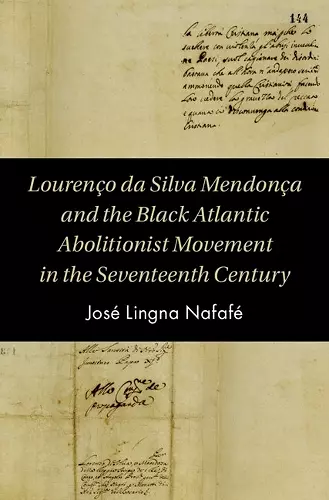Lourenço da Silva Mendonça and the Black Atlantic Abolitionist Movement in the Seventeenth Century
Format:Hardback
Publisher:Cambridge University Press
Published:25th Aug '22
Currently unavailable, and unfortunately no date known when it will be back
This hardback is available in another edition too:
- Paperback£25.99(9781009573726)

A groundbreaking story of African agency and the abolition of slavery, providing a new perspective on the Atlantic slave trade.
This groundbreaking study provides a new perspective on the Atlantic slave trade, highlighting the agency of Africans in the quest for abolition. The book reveals how the legal debate on abolition was begun by Africans, not Europeans. An essential new work for scholars and students interested in the abolition movement.This groundbreaking study tells the story of the highly organised, international legal court case for the abolition of slavery spearheaded by Prince Lourenço da Silva Mendonça in the seventeenth century. The case, presented before the Vatican, called for the freedom of all enslaved people and other oppressed groups. This included New Christians (Jews converted to Christianity) and Indigenous Americans in the Atlantic World, and Black Christians from confraternities in Angola, Brazil, Portugal and Spain. Abolition debate is generally believed to have been dominated by white Europeans in the eighteenth century. By centring African agency, José Lingna Nafafé offers a new perspective on the abolition movement, showing, for the first time, how the legal debate was begun not by Europeans, but by Africans. In the first book of its kind, Lingna Nafafé underscores the exceptionally complex nature of the African liberation struggle, and demystifies the common knowledge and accepted wisdom surrounding African slavery.
'By following Lourenço da Silva Mendonça in Angola, Brazil, Portugal and Spain and unveiling the criminal court case he presented before the Pope in 1684, José Lingna Nafafé reveals a universal message of freedom that in the 17th century crossed the Atlantic and reached the Vatican, doing justice to the African contribution to the abolitionist movement.' Giorgio de Marchis, Roma Tre University
'This is a groundbreaking study on the slave trade and its abolition. Nafafé privileges African perspectives on the debates regarding the legality of enslavement, combining a wide range of sources. The result is an engaging book, reconstructing the experiences of a 17th century Kongolese nobleman turned into an abolitionist. This is a crucial study problematizing the history of the slave trade and of the abolitionist movement, stressing the role of Africans as intellectuals debating rights in European courts. A must read.' Mariana P. Candido, Emory University
'In his extraordinarily well researched and carefully argued book, José Lingna Nafafé reveals the important role of Lourenço da Silva Mendonça in the lead-up to the abolition of slavery. Spending years combing through archives, Nafafé not only uncovered that Africans did indeed support the abolition of the slave trade, but that some were remarkably well placed to make a case for it. This is a substantial contribution to our understanding of African intellectual life and moral reasoning.' John Thornton, Boston University
'… this book is testament to Nafafé's years of research in the archives in Brazil, Portugal and the Vatican, and to his detailed understanding of the religious, literary and ethnographic contexts of the surviving sources.' Toby Green, London Review of Books
'Nafafé has done us a great service by bringing Mendonça's story to readers … Nafafé has written not only a great reference but an enjoyable read that illustrates how one man's life was shaped by Atlantic entanglements and how he dealt with those entanglements.' Miguel Valerio, H-LatAm (https://networks.h-net.org)
'This is an extraordinary book - erudite, rigorous, compelling, and transformational.' Gurminder K. Bhambra, Slavery & Abolition
'By centering African political and moral theory in Black Atlantic history, Lingna Nafafe makes a key contribution to the history of abolitionism.' Mary Hicks, Hispanic American Historical Review
'… this rich, provocative and accurate study raises questions and generously points to many very promising lines of research.' Michaela Valente, Archivio Storico Italiano
ISBN: 9781108838238
Dimensions: 236mm x 158mm x 33mm
Weight: 863g
377 pages